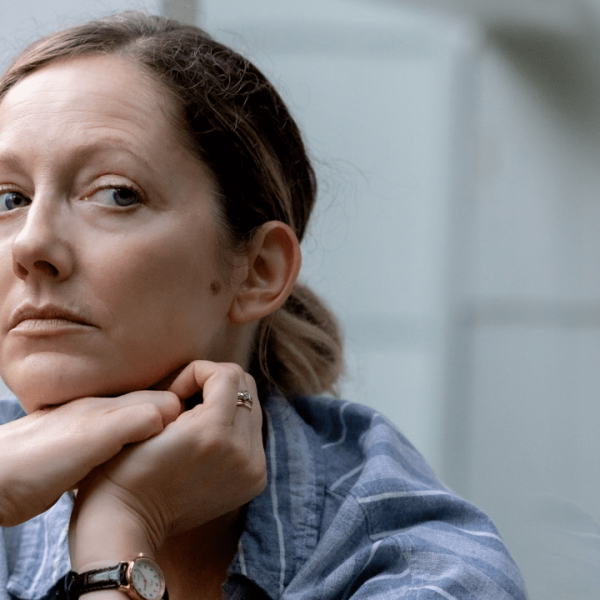Editor’s note: This review was originally published at the 2022 Venice Film Festival. Magnolia Pictures releases the film in theaters and on VOD on Friday, August 4.
Steve James’ “A Compassionate Spy” is ultimately a minor addition to one of documentary cinema’s great bodies of work (“Hoop Dreams,” “The Interrupters,” “Life Itself”), but it might just contain the one true secret to a happy marriage: sharing historically significant nuclear secrets.
That sure seems to have been a winning strategy for Ted Hall, a young physics student who fell in love with an undergrad named Joan at the University of Chicago in 1947. They seemed like natural soulmates from the start, but Ted’s inevitable proposal came with a radioactive disclaimer. If Joan wanted to spend the rest of her life with him, she would have to accept that Ted — who was admitted to the Manhattan Project as a preternaturally smart teenager — had passed crucial information about the atomic bomb to the Soviet Union.
Sickened by the power of the weapon that he and his colleagues had developed at Los Alamos, and unconvinced that the world would be any safer if the United States could unilaterally obliterate its enemies at will, Hall made a decision that would shape the rest of the 20th century to come. It was a decision that Joan understood, and one that she and her husband never fought about during a marriage that saw its fair share of the usual squabbles over dirty dishes and such; she loved Ted, shared his leftist inclinations, and agreed with his ill-placed optimism for the future of the Soviet Union. (They were both in the dark about the brutality of Stalin’s regime.)
It was also a decision that she guarded with absolute secrecy for many of the couple’s remaining decades together, even from their children. When Julius and Ethel Rosenberg were executed for espionage — despite offering the Russians less helpful intel than Ted had — it was Joan who convinced her husband to remain silent. And now that Joan is a 90-year-old widow at a time when the world is once again in need of individual actors who might put their civilization ahead of their country, it’s she who is sharing Ted’s story with the world.
Which isn’t to suggest that James’ sweet and gentle little documentary is breaking any news. Hall eventually outed himself in the ’90s, and has since been the subject of a book that contextualized the circumstances and consequences of his most fateful choice. (Authors Joseph Albright and Marcia Kunstel are two of the few talking heads in a film that are happy to let Joan tell the brunt of her own story.) James naturally touches upon the political implications of Hall’s actions — historian Daniel Axelrod and physicist Michio Kaku detail the United States’ plans to nuke the Soviet Union immediately after World War II, and the role that deterrence played in staying Truman’s hand — but “A Compassionate Spy” is more interested in providing an intimate portrait of a single person who knowingly took it upon himself to alter the course of history.
As you might surmise from the film’s title, “A Compassionate Spy” is extremely sympathetic toward Hall’s choice; it may have contributed to the nuclear arms race that continues today with no signs of stopping, but James is satisfied to classify that outcome as the lesser of two evils. More to the point, the rabid nationalism that might convince some modern viewers to see Hall as a villain is exactly what scared him into contacting the Soviets.
But while Joan is a warm narrator with a rich memory — her recollections enriched by generous snippets from the private video testimony that Hall agreed to shoot during the last months of his life — “A Compassionate Spy” struggles for deeper insight. Bookish science prodigies, it turns out, aren’t always the most naturally compelling subjects, and James doesn’t have access to the same toolkit on a low-budget documentary that someone like Christopher Nolan might have at his disposal while making an $100 million biopic about Robert Oppenheimer.
So, for the first time in his career, the director opts to stage dramatic recreations of the key moments from Hall’s life, a miscalculation that keeps “A Compassionate Spy” at arm’s length. It’s easy enough to appreciate why James might have felt compelled to reanimate the most romantic chapter of Ted and Joan’s love story — not least of all because it quickly became the stuff of a real-life spy movie, complete with tapped phones, FBI tails, and high-stakes interrogations — but the awkward recreations ultimately do more harm than good because James relies on them too much while asking them to do almost nothing.
The actors hired to play Ted, Joan, and Ted’s artistically inclined accomplice (and college roommate) Saville “Savy” Sax do their best to spirit us back in time and retrace the angles of the love triangle that brought them together, but their gauzy scenes are so fragmented and pantomimed that they only serve to make Joan’s memories seem fuzzier. Worse, they distract from the emotionality of revisiting them. Casting people to embody the vaguely “Jules and Jim”-like entanglement between these characters only exacerbates James’ failure to explore the crevices of Ted and Joan’s private lives (Savy is soon relegated to an afterthought), while a scene of the married couple driving by Sing-Sing prison on the night of the Rosenbergs’ execution — their faces pale with death — feels like a morbid bit of Cold War cosplay.
It’s possible that James simply couldn’t wring enough detail out of Joan (her poetry is sometimes the most telling part of her testimony), but “A Compassionate Spy” is oddly withholding in other areas as well. We spend some time with Ted and Joan’s children, and note the pacifist streak that seems to run through this family of low-key artists, but little is made of Hall’s influence. Late in the film, James shares that Ted’s brother engineered the rocket system that would now be used to propel the nukes that he once helped to develop, but the impact that may have had on their relationship is left unexplored. (James hardly seems impressed that two siblings came to occupy such complementary roles.)
And yet, if “A Compassionate Spy” is oddly dispassionate for a documentary so attuned to the humanistic inner-workings of history in progress, the film can’t help but find a measure of beauty in the unspoken trust that Ted and Joan placed in one another. Their marriage was built on such a serious and profoundly unshakeable foundation that nothing could ever hope to threaten it for as long as the two of them lived. Even now, when Ted is gone and the secret he shared with his wife has become a matter of public record, it still binds them together.
Grade: B-
“A Compassionate Spy” premiered at the 2022 Venice Film Festival.




